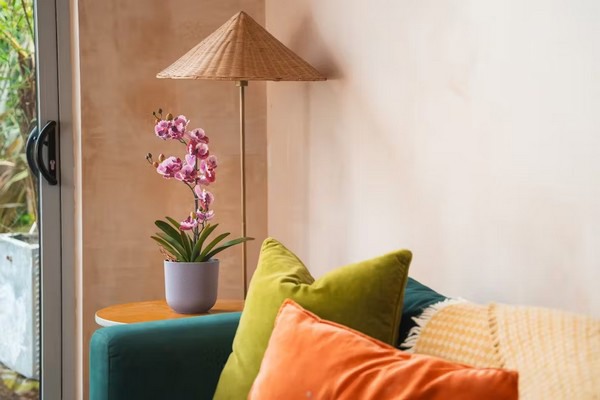New research finds that Brits are becoming more attached to their plants, as the number of reported 'houseplant deaths' has decreased by over 10% in the last four years.
The findings are revealed as part of a survey from faux plant and flower specialist, Blooming Artificial, shedding light on the nation's connection to flora and fauna. Speaking to over 1,000 people across the UK, the brand discovered:
- Over 40% of people claim to have not killed a houseplant in the last two years, while houseplant deaths are down 11% compared to the brand's previous survey in 2020.
- 69% of those surveyed claim mood-boosting benefits from their greenery, while around half (49%) report negative feelings following the death of a houseplant.
- Orchids, succulents and cacti, and peace lilies top the list as Britain's favorite plants, while Swiss cheese plants and dragon trees have dropped in popularity.
Alick Burnett, Managing Director at Blooming Artificial explains why plants are so good for our mood, "The inclusion of indoor houseplants not only introduces a sense of vitality but also enhances the overall welcoming atmosphere of a space. This is precisely why wellness centers and spas prioritize the integration of plants into their interior designs, helping to instill a serene and calming effect."
Respondents to the survey claimed these mood-boosting benefits whether the plant was real or fake, supporting previous studies that found patients recovering from surgery to report slightly lower blood pressure levels, as well as reduced pain, distress and physical discomfort when exposed to faux plants in their rooms.

The botanical bond is emphasized by the number of people negatively impacted following a plant's death (49%), with 54.8% of those being women. 25-34 year olds appear to be most attached to their houseplants, with 82% of the age group reporting positive benefits to their mood and 60% negatively impacted by their death, revealing a significant emotional investment.
The connection experienced by young adults may correlate to the rise of plant influencers across social media, which 42% of 25-34-year-olds reported as their favorite way to receive inspiration for their houseplants. The number of posts under the Instagram hashtag, #HousePlantsOfInstagram has increased by over 400% since 2020, when the brand last conducted this research. Similarly, #IndoorPlants has experienced a 298% increase, while the topic has seen 17,000 Google searches in the last month within the UK alone.
The rising plant trend appears to be having a positive impact on the number of houseplants being kept alive. In 2020, Blooming Artificial found that the average person killed 31% of their houseplants. The new survey shows that number has dropped to 20%, while 40% claim they haven't killed any houseplants at all purchased within the last two years, indicating that there is perhaps more information and guidance available on plant care than in previous years.
As for which type of plants are the most popular, orchids took the top spot, chosen by nearly 1 in 5 (17%) Brits. They are the favorite houseplant among every age group except for 25–34-year-olds, moving up one position since Blooming Artificial's 2020 rankings.
Sarah Dowsett, one of the brand's artificial plant experts, notes "Orchids are brilliant for an empty windowsill or as a table centerpiece, especially with their impressive blooms that are quite unlike any other houseplant. And if you love their unique blooms but struggle to keep them alive, you can always opt for realistic faux orchids instead."
Moving down a position, although still the favorite of 25-34-year-olds, are succulents and cacti, picked by 13% of respondents with their mostly low-maintenance nature making them a good choice for young professionals. In third place are peace lilies, up by three positions with an overall popularity of 9% and a favorite among older age groups, likely due to their practicality and elegant style.
Dropping significantly lower, however, are dragon plants, moving from third to twelfth, and Swiss cheese plants dropping two places from fifth to seventh, suggesting a shift in trends. Perhaps now overlooked, the dragon trees' unique foliage should still be recognized for its ability to introduce tropical color without overwhelming a room.
It may be that Brits are now preferring to steer away from bold tones, as a clear preference for natural materials can be seen among the most popular ways for displaying indoor plants. Clay, stone, ceramic and concrete options all top the rankings - combined, these were selected by 43% of respondents.
Source: bloomingartificial.co.uk
